- Home
- Marie Treanor
The Prisoner of Silverwood Castle
The Prisoner of Silverwood Castle Read online
Dead men don’t tell tales. They wail them from the top of the tallest tower.
Darke of Night, Book 2
Lady Guinevere (Guin) Harvey would much rather be writing gothic tales of intrigue and adventure than dancing attendance on her sister, the newly married Duchess of Silberwald. Until they arrive at Silberwald Castle, a place of enchanting perfection—and gothic shadows.
Ghostly groans and clanking chains lead Guin through ancient, misshapen passages to one of the castle’s many mysteries: a cell where the odd but charming Kasimir is kept chained like an animal. He could be a figment of her vivid dreams, the ghost of a dead, mad prince, or just a political prisoner no one wants to talk about.
Desperate to discover what beast is howling such soul-chilling cries, Guin summons the medium Barbara Darke. But by the time Barbara arrives, Guin can no longer distinguish dream from reality, friend from enemy. Even with all Barbara’s unique talents, they have to face new dangers before they finally discover the terrifying truth of Silberwald Castle.
Warning: Gives new meaning to falling madly in love…
The Prisoner of Silverwood Castle
Marie Treanor
Chapter One
My first sight of Schloss Silberwald changed everything. It rose up out of the mist in a fantastic array of turrets and towers, beautiful, mysterious, and just a little eerie. I was enchanted.
“It’s like a fairy-tale castle,” my sister Augusta said in clear relief. Well, as its new mistress, she must have had concerns about the establishments she’d come to preside over. And for Augusta, having married her prince, behold, the fairy tale continued.
For me, the castle seemed the embodiment of all my favourite gothic novels. I shivered with delight and allowed the last of my resentment to slip away.
Up until that moment, despite my interest in all the places we’d passed through and visited across Europe, I’d harboured the grudge that I’d been forced to accompany Augusta, the unwilling sacrifice upon the altar of her fairy-tale marriage to the ruling Duke of Silberwald. For once the ring was on her finger, Augusta had suddenly panicked that, splendid as her marriage was, she was about to journey to a foreign country where there were no guarantees that anyone but her husband and his aide spoke any English. And so I, as her last remaining unmarried sister, however plain, however small an asset to her consequence, and however much I irritated her, had been cajoled and browbeaten into accompanying her.
The cajoling and browbeating had taken many forms, and the perpetrators included all my sisters, their husbands, my brother the Earl of Alnwick, and a certain government minister. I’d dug in my heels and resisted from some perhaps foolish fear that I would be merely absorbed into Augusta’s life when I so desperately wanted one of my own making.
It was my stepsister Caroline who’d finally persuaded me. “Guin, it doesn’t have to be a punishment,” she’d said in her kind, yet humorous way. And she never shouted. I’d always appreciated that in Caroline. “This is an opportunity for you! To travel, and see the places you’ve dreamed of, to explore and discover and learn. If you truly want to be a writer, this is necessary for you.”
I allowed that she had a point, and with ill grace gave in. “I don’t see why she had to marry a German prince,” I’d muttered. “I blame the Queen for making them fashionable.”
Of course Augusta hadn’t just married any old prince. Leopold was the ruling duke of his sovereign state, tiny as that might be. And I had to admit our journey had been fascinating, although too quick for me to do the exploring I truly wished to. But now, at last, as we drove up to Schloss Silberwald—Silverwood Castle—, I was glad I’d come.
The smooth, well-maintained road wound around the hill. With a sense of rather delicious anticipation, I watched the castle grow bigger and more real as we drew closer, passing at high speed through a traditional village which I saw only as a blur.
There was a brief delay at the heavy iron gates, guarded by two splendidly unformed soldiers, and then we drove into the grounds. The horses picked up speed, as if anxious to be home, and Augusta and I peered out the carriage window to catch every glimpse we could.
The castle was built of pale grey stone. We clattered through a wide, ornately carved archway into a spacious courtyard, and the horses slowed and halted. Augusta straightened in her seat, unable to keep the smug smile from her face.
“It’s bigger,” she said, “than Alnwick Park.” To Augusta, this meant progression. In fact, it was nothing like the Georgian pile we’d grown up in. This was an actual castle. I itched to run inside it and explore.
But, of course, there were formalities to endure. The duke stepped down from his own carriage while one of the liveried servants opened the door to ours and let down the steps. The duke advanced towards us.
I didn’t care for my new brother-in-law. Although he seemed to suit Augusta very well, and he was never anything other than polite, I found him…cold. Not yet forty years old, His Highness Prince Leopold, Duke of Silberwald, had a full head of brown hair, receding at the temples in a distinguished manner. His controlled, expressionless face was pale, divided by a thin, haughty nose, down which he liked to look at lesser mortals, and graced by a thin-lipped mouth, a square chin, and eyes that weren’t quite fishlike.
He bowed and personally handed his bride from the carriage in the kind of stately gesture Augusta most admired. I wondered what, if anything, lay beneath his civil pomposity and also how she could bear to be married to such a man. A horrible and quite un-maidenly vision of their intimacy flitted through my brain and was banished with desperate haste.
Button, Augusta’s wide-eyed English maid, and I followed her with the help of only the liveried servants. I was happy to let Augusta bear the brunt of the formal welcome. A carpet had been spread from the duke’s carriage to the main entrance to the castle, and it was lined with formally dressed noblemen and women in brightly coloured silks and lace. They all bowed and curtseyed deeply as the duke progressed with his new bride. He paused occasionally to present the favoured to Augusta, who carried off the ordeal with an enviable air of entitlement.
I felt like grabbing Button’s hand for mutual support, though fortunately I restrained myself. In fact, since all attention was on the happy couple, we blended into the duke’s lesser entourage and no one paid us any attention at all. Which left me free to gaze around at the formidable entrance way. Close to, the castle was more military than fairy tale, reminding me that its primary purpose had always been defence. In fact, it had been besieged during the late revolution, which the present duke had put down with such ruthless efficiency.
The entrance hall was magnificent—all ornately carved stone and wall torches with a wide, curving stone staircase sweeping upward on the far side. I shivered with delight, feeling a story of profound atmosphere coming on: a pale figure gliding down those stairs, the ghost of some long forgotten lady… Oh yes.
Reluctantly, I trailed after everyone else into a disappointingly modern, though still splendidly massive hall, where Augusta was divested of her travelling cloak and, after a brief speech of welcome from some dignitary or other, was invited to visit her own private apartments.
Augusta graciously assented, and two of the finely dressed ladies stepped forward to accompany her. She would have sailed off without a backward glance at me, except that the duke suddenly seemed to remember my existence and looked around.
“Lady Guinevere?” he called.
I cringed. For although I rather like being called after a literary character, the name does not suit me. I am small, plain, short-sighted, and booki
sh, and I had more than once, during my dreadful “season” in London, overheard sniggering at the very idea that knights might vie for my attention.
“Stay with me,” I advised Button, who was clearly lost in this sea of nobility, and pushed through in my sister’s wake.
“My sister-in-law,” the duke introduced me grandly, still in English. “Lady Guinevere Harvey, who attends the duchess.”
Attends? No one had called it that before they’d shoved me into the coach with her. Prickles stood out all over my body. I felt like a hedgehog. But I bit my tongue and trailed after the duchess.
* * * * *
I forgave her all over again when I saw my bedchamber. It was in the old part of the castle, and it had a low, vaulted ceiling and bare, unplastered stone walls on which hung some ancient and very dusty tapestries. Since it was growing dark, I lit the lamp and stood on my trunk to reach the little window catch. I had to wrestle with it to make it open, as if the cobwebs were trying to hold it shut. Although my sisters would not have approved of the housekeeping—and in fact, even I considered a little dusting to be in order here—I liked the little chamber far more than Augusta’s grand, luxurious apartments. It seemed I had maligned my brother-in-law the duke, and he understood me much better than I had thought.
In perfect charity with him, I unpacked my clothes, seized a clean gown to wear for the rest of the evening, and put the rest away in the oak wardrobe which looked a little out of place but was at least useful. I washed my face in the bowl provided, gasping at the coldness of the water, then brushed and repinned my hair, and, with difficulty, found my way back to Augusta’s apartments.
She had a bedroom, a dressing room, a cosy dining room, and a large sitting room. They were all utterly feminine, with no sign of the duke’s accoutrements, so I could only assume his rooms were elsewhere. Perhaps through one of the two doors at the end of the sitting room. I wasn’t sure I would care to live like that if I was married. Provided I liked my husband, of course, and I had long ago decided that nothing except actual love would induce me to marry anyone, however rich, powerful, or influential. Fortunately, my brother the earl seemed to be content with those commodities he’d already gained through my sisters’ marriages, Augusta’s being very much his trump card. So I doubted I would have to fight very hard for my independence. Once I got away from Augusta.
We were to have a comfortable “family” meal. Augusta and I sat down with the duke, his younger brother Prince Heribert, and Augusta’s two ladies-in-waiting.
“It is late, and we are all tired from travelling,” the duke pronounced. “So, I thought this cosy supper would be an excellent thing, to help you, my dear, relax into your new abode and become acquainted with your new ladies, who will do everything in their power to help you settle in.”
The younger of the two ladies seemed already to be lost in admiration of Augusta, who did, I admitted, look even more beautiful than usual in her new surroundings. I suspected she was getting her own way in everything.
The elder of the Silberwald ladies, the elegant, grey-haired Baroness von Gratz, took the trouble to smile at me kindly and to speak in English.
“You are a good sister to travel so far with the duchess. Such devotion.”
I suspect both Augusta and I looked completely baffled by that interpretation.
“We thought it best,” I mumbled.
“I hope your bedroom is satisfactory? We are a little overcrowded at—”
“I love it, thank you!” I said with enthusiasm.
It was the baroness’s turn to look baffled.
“Sehr schön,” I said to avoid confusion. I’d been teaching myself German from a book on the journey, trying out my pronunciation on several of the duke’s servants and hotel staff as we travelled. I was quite pleased with my progress.
“Schön,” the baroness repeated faintly.
Well, I thought it beautiful.
As I set about my food—I was starving and it smelled delicious—I was aware of the duke’s gaze upon me, approving, perhaps, or reassessing. I didn’t much care. I was looking forward to exploring his castle.
We were to stay here for several days, I understood, before travelling on to the capital city of Rundberg where the duchess would be formally received and the duke could attend personally to matters of state, including, I gathered from the brief conversation he conducted in German with his brother, some continuing unrest.
I was intrigued by this. I’d been reading up on Silberwald, and it wasn’t all good, despite the more liberal reforms promised by the duke’s government since the revolution. However, even I could see this was not a great time to bring up such matters. The politics was more of a private, almost breathless aside in the midst of the main event which was, I thought cynically, sucking up to the duchess.
Prince Heribert seemed genuinely dazzled by her. The ladies-in-waiting, even the baroness, hung on her words. The duke watched with approval, so far as I could tell. I ate the excellent supper with gusto, wondering how soon I could escape and explore. I wasn’t remotely tired.
After supper, the duke stood, raising his wineglass, and proposed a toast to his duchess. After which he and his brother both kissed her hand and departed.
“I took the liberty,” the baroness said, “of ordering tea to be served in your highness’s sitting room. I understand this is your custom.”
“Thank you,” Augusta said, standing. “Then let us go and partake.”
One cup, I thought happily, as I tripped after the others into the sitting room, and then I’m off!
A maid was just leaving a heavy tea tray on the occasional table, which was surrounded by an array of chairs and a sofa.
Augusta draped herself languidly on the sofa and waved one hand in my direction. “Guin, you see to it.”
“Oh no, please let me,” the baroness said, pressing my shoulder as I made to stand again. “The weary travellers should rest.”
The tea was duly poured, milked, and passed by the younger lady, whose name seemed to be Hilde. The porcelain cups were exquisite, eggshell china, smooth as silk against my lips. The tea itself wasn’t great, but the Silberwald ladies seemed so pleased with their achievement that I pronounced it excellent. Augusta made no comment.
I drank it quickly and said good night. Augusta frowned at me, as if I should have asked her permission. Then, when I laughed, she waved me away with an irritated flick of the wrist. She had Button and her adoring new ladies in waiting.
The passages back to my own chamber had grown chilly, making me shiver, so I resolved to collect a shawl before I went about exploring.
I found a maid in my room, closing the shutters and the window.
“Pardon me, my lady,” she said hastily in her own language. “It gets cold at night.”
“Of course. I shouldn’t have left it open. I was admiring the view.”
The maid gave a nervous smile as she clambered down from my trunk and hurried towards the door.
“What else is along this passage?” I asked. “More bedrooms?”
“Oh no, my lady. Only yours. Beyond here, the old part of the castle isn’t safe.”
“You mean it’s falling down?” I wasn’t sure if I was more intrigued or appalled.
“Bits of it. Many collapsing walls, I believe.”
“You believe?” I pounced. “Haven’t you seen for yourself?” Nothing very short of certainty of death or severe injury was going to keep me from my explorations. “Haven’t you seen for yourself?”
“Oh no, my lady, I don’t go down there. No one does.”
Then how did they know it was dangerous? “Why not?” I asked.
“Well it’s haunted, my lady, for one thing.”
Of course it was. I shivered with delight. “Really?” I took a step closer. “By what? Have you ever seen a ghost there?”
“No
, I never have,” the maid admitted. “But then, I’ve never been farther than this room and wouldn’t either, if I could help it. You hear strange noises in the old wing.”
“Like what?” I asked avidly.
“Oh, banging, tortured cries like souls in torment. So faint you can barely hear them, but still, when it’s dark, they echo sometimes. Makes your flesh crawl.”
“I imagine it might,” I said, impressed.
I had a load of other questions to ask, but as I opened my mouth, the girl seemed to shake herself and said, “Will that be all, my lady?”
“Oh yes, thank you.” Since she was clearly in a hurry, I’d find out for myself. It would, I assured myself, be more fun that way. So I let the maid go and set about my preparations. Before dousing the lamp, I lit a candle from it, setting it on the bedside table while I dug a shawl from the wardrobe.
But I yawned as I wrapped the shawl around my shoulders and languidly pushed my spectacles more comfortably onto my nose. On impulse, I sat down on the bed, trying it for comfort, and realized I was more tired than I’d thought. Although I didn’t mean to close my eyes, I did.
* * * * *
The silhouette of a candle flame flickered up the wall, peaceful and mesmerising. I lay on my bed, fully dressed. The glow from my bedside candle lent an extra eeriness to my delightfully gothic room; but since a certain fuzziness clung to the edges of my vision, I knew I must be dreaming.
A sound like a human cry, long and plaintive, echoed from the bowels of the castle, both thrilling and chilling to the blood. Just as the maid had described it. But at least my dream was one of those interesting ones, where you seem to be able to control what happens next.
So I rose from my bed, and as I’d meant to do in reality before I fell asleep, picked up the candle, and sallied forth into the ancient corridor. Instead of going towards Augusta’s room, I went the other way, heading into the haunted depths of the old castle. My dream gave the walls a slightly strange shape, almost like a tunnel. When I thought about it, my bedroom had changed to be a bit like that too.

 The Dead of Haggard Hall
The Dead of Haggard Hall Blood Sin (2)
Blood Sin (2) In Her Secret Fantasy
In Her Secret Fantasy Serafina and the Virtual Man (Book 2 of the Serafina's Series)
Serafina and the Virtual Man (Book 2 of the Serafina's Series)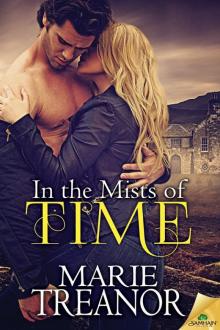 In the Mists of Time
In the Mists of Time Loving the Vampire
Loving the Vampire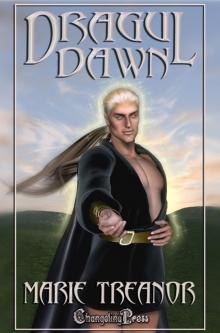 Dragul Dawn
Dragul Dawn Killing Joe
Killing Joe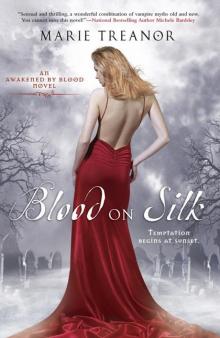 Blood on Silk
Blood on Silk Serafina and the Silent Vampire
Serafina and the Silent Vampire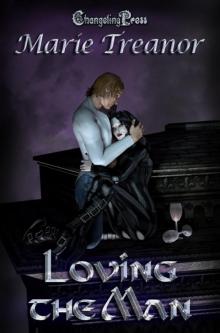 Loving the Man
Loving the Man Ariadne's Thread
Ariadne's Thread Blood Guilt
Blood Guilt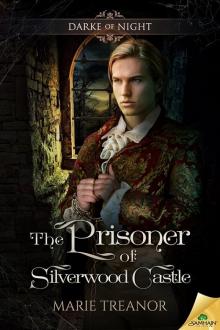 The Prisoner of Silverwood Castle
The Prisoner of Silverwood Castle Blood of Angels (Book 2 of the Blood Hunters Series)
Blood of Angels (Book 2 of the Blood Hunters Series) Blood Eternal
Blood Eternal Hunting Karoly
Hunting Karoly Requiem for Rab
Requiem for Rab In His Wildest Dreams
In His Wildest Dreams